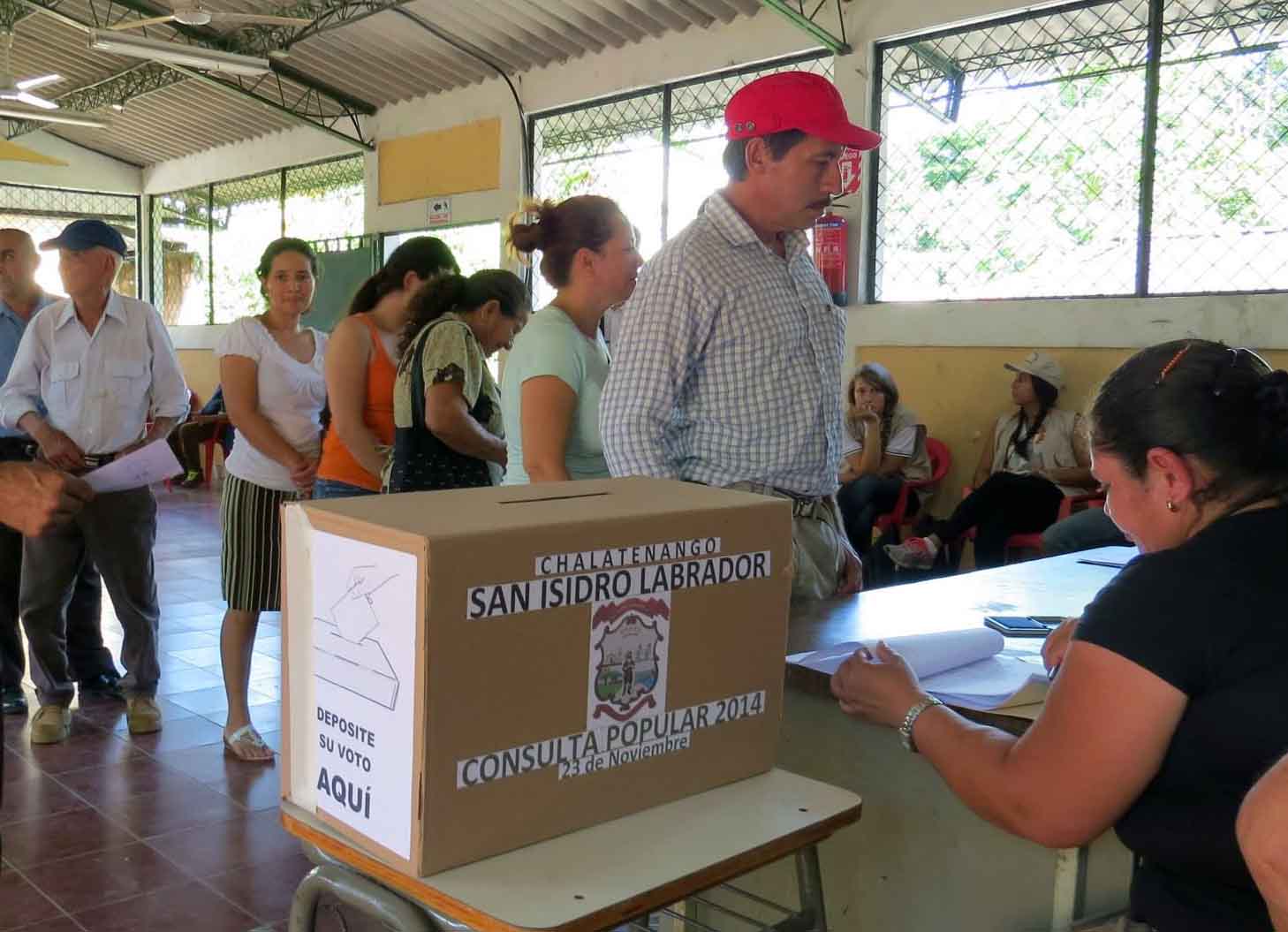P. Cabezas
Territorial organization to strengthen local democracy a key strategy for anti-mining activists in the country's unpredictable political environment.
 The municipality of San Isidro Labrador was declared free of mining after 98.74% of the registered voters who cast a ballot in a referendum held on Sunday November 23 said no mining.
The municipality of San Isidro Labrador was declared free of mining after 98.74% of the registered voters who cast a ballot in a referendum held on Sunday November 23 said no mining.
This is the second municipality to hold a local mining consultation in the region that has since 2004 been impacted by four known mining exploration concessions covering an area close to 200 square Kilometres.
“Information gathered from the ministry of the economy tell us that more than 10 municipalities are directly affected by proposed mining projects in the department Chalatenango” states Marcos Galvez, president of CRIDPES, a local community development organization that has worked in the area for over three decades and is now leading the Territories Free of Mining campaign with support from the National Roundtable against Mining and international solidarity organizations.
Last year, CRIPDES’ organizers began to implement a multi layered organizing strategy to coordinate efforts with local community organizations in each municipality affected by mining in the region to organize, educate and collect signatures in order to petition municipal councils to hold consultations on mining.
Following the request by community organizations, municipal councils must vote on a resolution to call for a Popular Consultation, required by law if 40% of registered voters sign the petition. They must also appoint a Municipal Electoral Board to oversee the ballot and set a date for the consultation. If enough constituents vote to ban mining, the results of the consultation are later utilized to draft a municipal environmental ordinance to that end.
“These, locally based, organizing efforts are necessary to keep our communities alert and involved in the anti-mining struggle” continues Galvez”.

The national anti-mining movement in El Salvador has had tremendous success over the years. It is recognized around the world as the only movement that has managed to pressure a succession of three governments to maintain a national moratorium on mining with support from a wide range of sectors of society including the Catholic Church, at least one major political party, and a variety of government and non-government institutions.
But, for communities anxious about the long term impacts of mining projects in their territory, a moratorium is not enough. "We are aware that the legislative assembly has failed to pass a national law that prohibits mining so we must innovate on already existing laws to protect our territories from extractive companies”, Galvez explains.
Early this year, anti-mining activists welcomed statements from the newly appointed minister of the environment, Lina Pohl, who confirmed that the incoming government of President Salvador Sanchez Ceren, would maintain a moratorium implemented in 2008. She went further to declare that conditions were ripe for an eventual agreement on legislation to prohibit mining at the legislative assembly.
But as the realities of the new government settled in, hopes for action quickly faded as right wing political parties that hold the balance of power at the legislative assembly evidenced their unwillingness to negotiate progressive environmental legislation.
The Environment and Climate Change Commission, where proposed laws such as the law for the prohibition on mining, the general water law, and the law to prohibit deadly agro toxics are negotiated before they are submitted for legislative approval, has been paralyzed since August 2013 as pro-business members of the commission utilize delaying tactics to curb debate.
In late October, an attempt to ratify a constitutional reform to recognize the right to food and water was defeated as the right wing parties, ARENA and PCN went back on early commitments to support the reform.
Earlier in October a reversal of fortunes for the water rights movement became evident as right wing members of the commission voted to reverse an early decision to set up a publicly managed National Water Commission to administer water resources of the country, instead they agreed on the creation of an autonomous entity controlled by the private sector. And discussion at the commission shows that right wing parties, ARENA, GANA and PCN are building consensus to change aspects of the general water law that would undermine the public management while favouring further privatization of the limited water resources.
The upcoming legislative elections in March 2015 can potentially reverse all the gains made by the environmental movement if a larger number of right wing legislators gain a qualified majority at the Legislative Assembly that would make the progressive FMLN government unable to pass any legislation.
On the anti-mining front, a pending ruling by the International Centre for the Settlement of Investment Disputes, ICSID, in the case of Pacific Rim Vs. El Salvador, expected in early 2015 may force the government to pay hundreds of millions of dollars to the company for not extending a mining exploitation permit or reconsider the possibility of extending mining permits.
The potential impact of the ICSID ruling has anti-mining activists in El Salvador rethinking their strategy for possible game changing scenarios.
“We cannot sit and wait to react to the circumstances” Galvez continues, “we have witnessed the obstacles that the government is having to implement a permanent prohibition on mining and we can no longer wait for that strategy to bear fruit.. we have to go back and rebuild alliances with the communities that gave birth and are the base of the anti-mining movement in the first place.”
